FAQs
Where can your book be purchased?
You can purchase the book at all major bookstores and online. You can also purchase an autographed copy from my website.
How do you feel now that your book is being published?
It’s very exciting to go to the bookstores and see my book on the shelf.
Why has the research taken more than thirty years?
In addition to tracing my own ancestry, I have traced the history of each family associated with Wessyngton Plantation, including the owners of the plantation. This involved examining tens of thousands of documents, census records, wills, bible records, reading hundreds of letters, and interviewing descendants of the slaves and the plantation owners.
What do you think African Americans can take from your book?
As Oprah Winfrey and other African Americans have often stated, with the election of Barack Obama, it is finally time for African Americans to embrace their past, and to learn who they are. My research and my book can give the history that would be a building block for a strong today and tomorrow. I tell the stories of my ancestors and 274 African Americans who were enslaved on a tobacco plantation near Nashville. And the stories are the stories of real people based on documents and interviews with descendants. What comes through are stories of survival, of family, and of community. President-elect Obama stated that one of the themes of his inauguration would be “coming together.” My research is an example of that phenomenon. Descendants of the plantation owners shared their photographs and remembrances with me; one of them sponsored some of the many DNA tests I conducted.
Can you tell us how your story began and how you got published?
My story began when I was in the seventh grade. While flipping through my social studies textbook I spotted a photograph of four former slaves, entitled Black Tennesseans. For some reason I kept being drawn to the photo and would look at it each time I went to class. Later I learned from my grandmother that two of the people in the photograph were her paternal grandparents, Emanuel and Henny Washington, who were born slaves on Wessyngton Plantation. After that discovery I became totally fascinated with the plantation’s history and started the lifelong research project that later became The Washingtons of Wessyngton Plantation: Stories of My Family’s Journey to Freedom. For decades I interviewed children and grandchildren of former Wessyngton slaves as well as descendants of the plantation owners. I collected more than 100 photographs and examined thousands of documents. After more than three decades of conducting interviews, collecting data, and the passing away of the older generation, I found that I was the sole keeper of all this priceless information and it was my responsibility to preserve it for future generations. For more than 30 years, while I was in school, studying banking at Nashville Tech, working full time, and actively involved with my church, I found time to talk to my elders and do research. It was my passion. I wrote bits and pieces until a few years ago when I decided it was time to put it all together. I always wanted to get my research published, but had no idea how to go about it. I studied books on how to get published and wrote a book proposal. I looked for agents who had published African American authors. My book was picked up by one of the first agents to whom I sent my proposal, and within a month in 2007, Atria, a division of Simon & Schuster bought it. The Washingtons of Wessyngton Plantation will be published in February 2009. While this is a dream come true, the fact that the publication coincides with the inauguration of the first African American president adds to the significance of my achievement. I feel it is an honor to be connected with this historic event.
Do you think your ancestors or any of the other people in your book would have thought that we would have an African American president in 2009?
Ever since the victory of Barack Obama, people ask me what the Washingtons of Wessyngton Plantation would have thought about this historic event. More than 30 years ago when I started researching the lives of the 274 African Americans enslaved on the plantation, I never imagined such a question. When I interviewed more than 25 descendants of Wessyngton slaves, I never thought to ask them that question. When I spent hours talking with Mrs. Ann Nixon Cooper, the 106-year-old lady from Atlanta whom President-elect Obama spoke about so eloquently in his acceptance speech, she and I never spoke about that possibility in her lifetime. Yet here it is. My great great grandparents, Emanuel and Henny Washington, were born on the plantation and remained there until their deaths in the 20th century. Other families remained on the plantation or the general area. Many of their descendants still reside here. They understood the power of prayer, family and community to overcome whatever obstacles they faced. They saw their secret prayers answered when they were emancipated in 1865 after generations of slavery. This no doubt seemed impossible, yet they kept the faith and ensured their children that one day God would deliver them from slavery. I think the former slaves may not have been as surprised as some of us that today we would have an African American president and a first lady whose ancestors were once enslaved.
When did you first begin your research?
My research started when I was in the seventh grade and spotted a photograph of four former slaves in a social studies textbook. I later learned from my grandmother that two of them were her grandparents, Emanuel and Henny Washington, who had been enslaved on a plantation near my home called Wessyngton. The plantation was founded in 1796 by Joseph Washington, a distant cousin of President George Washington. After the discovery of my ancestors I became totally fascinated with the history of the plantation and traced the genealogies of all the families connected to it including the plantation owners.
How did you document more than thirty years of research?
I used records from the Washington Family Papers in the Tennessee State Library and Archives to document most of my research. The collection is 11,200 items store on sixty-nine rolls of microfilm. Most of the documents from the collection used for my research include: slave bills of sale, slave birth registers from 1795-1860, letters, wills, diaries, account books, tax records, photographs, portraits, and inventories of slaves on the plantation. Many of these documents supported the oral history collected from African American descendants and descendants of the plantation owners.
What has been some of the most inspiring moments in unraveling your family history?
One of the things that inspired me the most in tracing my ancestry and the other families that were enslaved on Wessyngton was their accomplishments in spite of the odds. I learned that my ancestors and others established one of the first churches in our county which was later used as a school. The parents had to pay $1.00 per month for their children to attend school, which was a great sacrifice, as most of them only earned fifty cents per day. Several former slaves enrolled in school when they were in their thirties and forties because education was so important to them and had been denied them in slavery. Some of the African Americans from Wessyngton purchased hundreds of acres of land part of which they had once been enslaved on. In the first election after their freedom every male on Wessyngton that was over twenty-one was registered to vote. Several men from the plantation enlisted in the Union Army to fight for their freedom. Nearly every family on Wessyngton before and after emancipation was headed by a male. Before conducting the research I had never heard many of these things. After all the years of research and collecting thousands of documents I realized that it was my duty to preserve the history for future generations.




